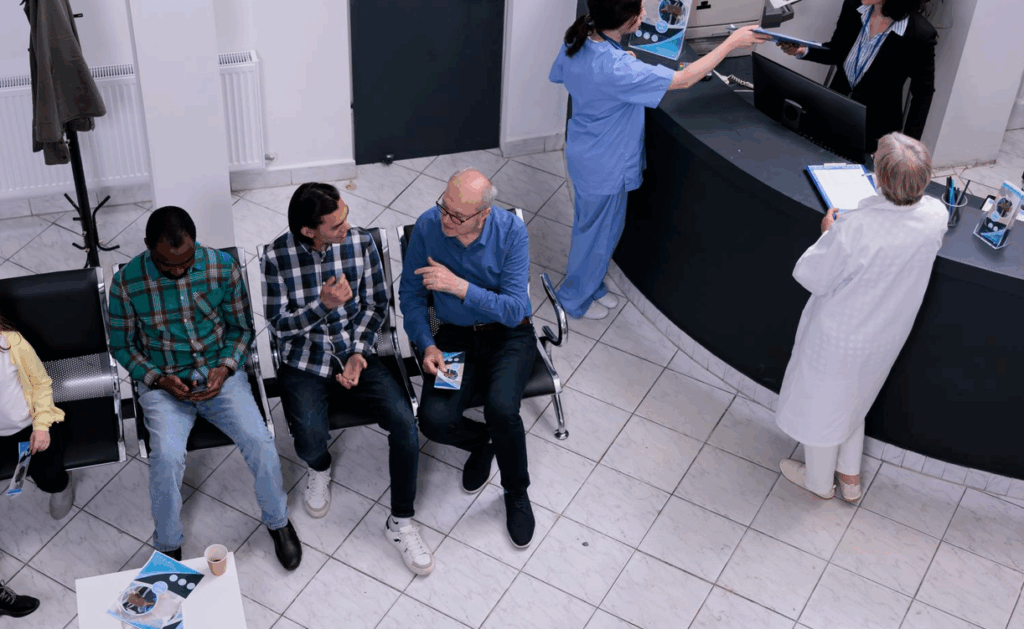Lakeside Healthcare Corby, located on Cottingham Road in Corby’s health district, serves thousands of patients while juggling its dual roles as a neighborhood clinic and a part of the larger Lakeside Healthcare Group. Doctors like Dr. Mali and Dr. Singh, nurses like Emma, and a changing administrative team trying their best to handle a system overflowing with demand define this practice, which is driven by faces but defined by scale. Some people describe their appointments as quick but therapeutic meetings. For others, the true obstacle is still access.
There is a way forward, but only if the timing is right. Sometimes navigating care at Lakeside Corby is like attempting to board a train during rush hour. To improve communication and cut down on delays, Anima, a digital patient access platform, was introduced. Patients can submit issues in writing and avoid lengthy phone lines by using integrated online requests. This has greatly decreased frustration for many users, especially those who are younger or more tech-savvy. However, for others, particularly elderly patients or those who are not tech-savvy, the change has created new challenges rather than eliminated old ones.
| Facility Name | Lakeside Healthcare Corby |
|---|---|
| Location | Cottingham Road, Corby, Northamptonshire, NN17 2UR, United Kingdom |
| Phone | +44 1536 204154 |
| CQC Provider | Lakeside Healthcare Partnership |
| Online Access | thelakesidesurgery.co.uk |
| Core Services | GP consultations, vaccination, repeat prescriptions, diagnostics, Anima |
| Group Affiliation | Lakeside Healthcare Group (serves ~170,000 patients across sites) |
| NHS Status | Currently accepting new patients |
| CQC Summary Rating | Inspected and operational with areas under development |
Through hundreds of online testimonials, patients continue to emphasize the competence and compassion of the healthcare professionals despite technological challenges. Doctors are often singled out by name in reviews: Dr. Singh has been characterized as “exceptionally clear and patient-focused,” while Dr. Mali is described as “thorough and genuinely kind.” These praises aren’t prewritten; rather, they are provided by patients who are dealing with difficult diagnoses, persistent pain, or persistent health scares. They are frequently remembering encounters that influenced a change in their mental or physical course.

This recurrent theme—clinicians going above and beyond their clinical responsibilities to provide incredibly individualized care—is especially noteworthy. For instance, Lakeside employees were among the first to implement extended vaccination schedules during the pandemic, running clinics on the weekends and interacting directly with patients who were at risk. Nurses like Emma, who are frequently highlighted in reviews, did more than just give shots; they also helped patients feel less anxious and transformed regular visits into times of trust. Relationships are forged by that kind of empathy-based care that algorithms cannot imitate.
Practices like Lakeside Corby have recently turned into miniature representations of a larger national issue. It is anticipated that GP practices will shift toward digital infrastructure, do more with fewer staff, and preserve the personal touch of family care. It’s like navigating a big ship through a narrow canal—it’s possible, but it’s never risk-free. Feedback regarding Lakeside’s phone system makes this very evident. While some users claim to be called back almost instantly when using Anima, others report standing in line for more than an hour. Because of its inconsistency, patient trust must be continuously restored.
Nevertheless, innovation is obviously in motion. Now a visible member of the team, social prescribers are providing advice on loneliness, housing insecurity, nutrition, and mental health. These allied roles are increasing the responsiveness of the whole care ecosystem by simplifying operations and freeing up GP bandwidth. Although the model is being adopted nationwide, it is being tested firsthand in practices like Lakeside Corby, where it is influenced by the realities of everyday patient care.
For instance, it was more than just clinical care when cancer patient Kelly McGinlay publicly thanked her physician for ongoing support. It was about being heard. She wrote, in an encouraging and eerie review, “Kind, caring, and always listened to me.” It serves as a reminder of what primary care means to those who are most in need of it. It also demonstrates the extraordinary power of effective communication in facilitating intricate journeys.
Additionally, Lakeside’s approach to chronic care has significantly improved. Many patients are now being seen using hybrid models, which involve an initial phone consultation followed by diagnostics or, if necessary, an in-person review, rather than needing several, spaced appointments. Although the system still needs to be improved to guarantee that no group is left behind, this has greatly decreased bottlenecks and given clinicians the ability to manage their time more skillfully.
The fact that Lakeside Healthcare Corby serves as both a service provider and a structural prototype makes it especially pertinent. The collaborative model used by the Lakeside Group, in which several practices share systems, staffing, and data, is a reflection of the NHS’s long-term goals for integrated care systems (ICS). However, the issue is not one of policy at the local level. Experience is key. Patients want calls to be answered, appointments to begin on time, and prescriptions to not disappear while in transit.
If there is one thing to learn from Lakeside Corby’s conflicting reviews, it is that public healthcare is evaluated based on the process leading to results rather than just the results themselves. Practices like this must balance scalability and humanity in the face of an aging population and tight budgets. Thankfully, the Lakeside team appears dedicated to both—process improvement while maintaining purpose.
Surgeons like Lakeside Corby might be ahead of the curve in the upcoming years as AI tools start automating triage, identifying risk factors, or even writing appointment summaries. However, no system, no matter how smart, can take the place of human warmth, intuition, and judgment. Because of this, the most important reviews celebrate people rather than features or functions.
